Planning for the Future of Aging

State of the Agency Repor t Fiscal Year 2024-2025 (Anticipated)



State of the Agency Repor t Fiscal Year 2024-2025 (Anticipated)


Dear Friends of PCA,
All Area Agencies on Aging are built on the foundation of the Older Americans Act (OAA) and guided by the goal of keeping older adults as independent as possible. At Philadelphia Corporation for Aging (PCA), we help older adults stay connected to the community and remain safely in their homes. We are steadfast about protecting older adults, advocating for their rights and benefits, and serving people with the greatest social and economic needs. It is our responsibility to have the voices of those we are advocating for heard as much as possible.
Building upon an incredible 50-year legacy of service to older Philadelphians and adults with disabilities, PCA is focused on planning to meet the future needs of this diverse older adult population.
In my 25 years of working in aging services, there has been a steep, steady increase in the total number of older adults, as well as in the number of people who are living longer and require additional services to maintain their maximum independence in the community. At the same time, all organizations that have social missions are struggling to find the resources and funding to keep pace with the growing needs of the individuals that we serve. States and the federal government are making sure that funding is allocated efficiently. Private funders are also
looking for more accountability when contributing to make an impact.
At PCA, there is an increased focus on prioritizing programs that improve outcomes that serve older Philadelphians. We are continually re-evaluating how to strengthen these programs and make sure that the limited resources go to the right places.
To aid us in these endeavors, Pennsylvania has led the charge with “Aging Our Way, PA: A Plan for Lifelong Independence,” which will serve as “a 10-year roadmap to meet the needs of the Commonwealth’s older adults and to improve services for this rapidly growing population,” according to the Pennsylvania Department of Aging. The plan will inform PCA in its work to support and improve the health, well-being and quality of life for older Philadelphians.
PCA is currently drafting its latest four-year Area Plan for Aging Services (2024-2028), following a comprehensive community needs assessment. PCA’s key topic areas and new priorities for the next four years will be:
• Focus on Older Americans Act core programming.
• Examine lessons learned from the COVID-19 pandemic.
• Address equity issues in service access and provision.
• Expand access to home- and community-based services.
• Increase caregiver support.
PCA has a tremendous history and deep roots in the community. Now, we have to look at the things we do well and ask ourselves, “How can we improve to meet even more of older adults’ needs?” We are looking at ways to better support our consumers and our stakeholders, including building a better organization for our workforce.
The future is now.
Over the next few years, the field of aging services will embrace technology more. Partnerships will strengthen our work. We will collaborate with medical programs, community-based organizations and entities like health information exchanges. Data collection, health care and social services will all be discussed in the same conversation, instead of being siloed, as they have been in the past.
Innovation means utilizing resources wisely while finding ways to serve more people. We are looking at processes and practices – from operations to the services provided – for ways to streamline the work we do to make it more effective and efficient. Training and implementation are keys to success. At PCA, our goal is to be the model for the nation related to the provision of services that support maximum levels of health, independence and productivity.
Sincerely,
 Najja R. Orr, DBA, FCPP President and CEO, Philadelphia Corporation for Aging
Najja R. Orr, DBA, FCPP President and CEO, Philadelphia Corporation for Aging
For more information about PCA’s programs and services, please contact the PCA Helpline at 215-765-9040 or visit our website at pcaCares.org.
To improve the quality of life for older Philadelphians and people with disabilities and to assist them in achieving their maximum level of health, independence and productivity.
PCA is a private, nonprofit organization, serving as the Area Agency on Aging (AAA) for Philadelphia County, and the first place for older Philadelphians and adults with disabilities turn to for information and services to improve their lives. Established in 1973, PCA provides vital programs that allow individuals to remain engaged in their communities and empowered in their homes, while giving special consideration to those who have the greatest economic and social needs.
With more than 50 years of experience caring for older adults, PCA touches the lives of 140,000 Philadelphians each year with more than 30 services.
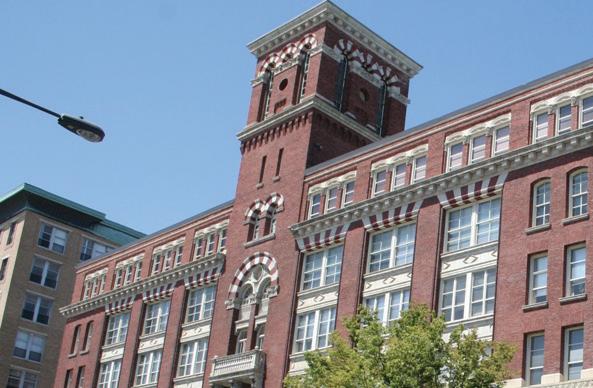
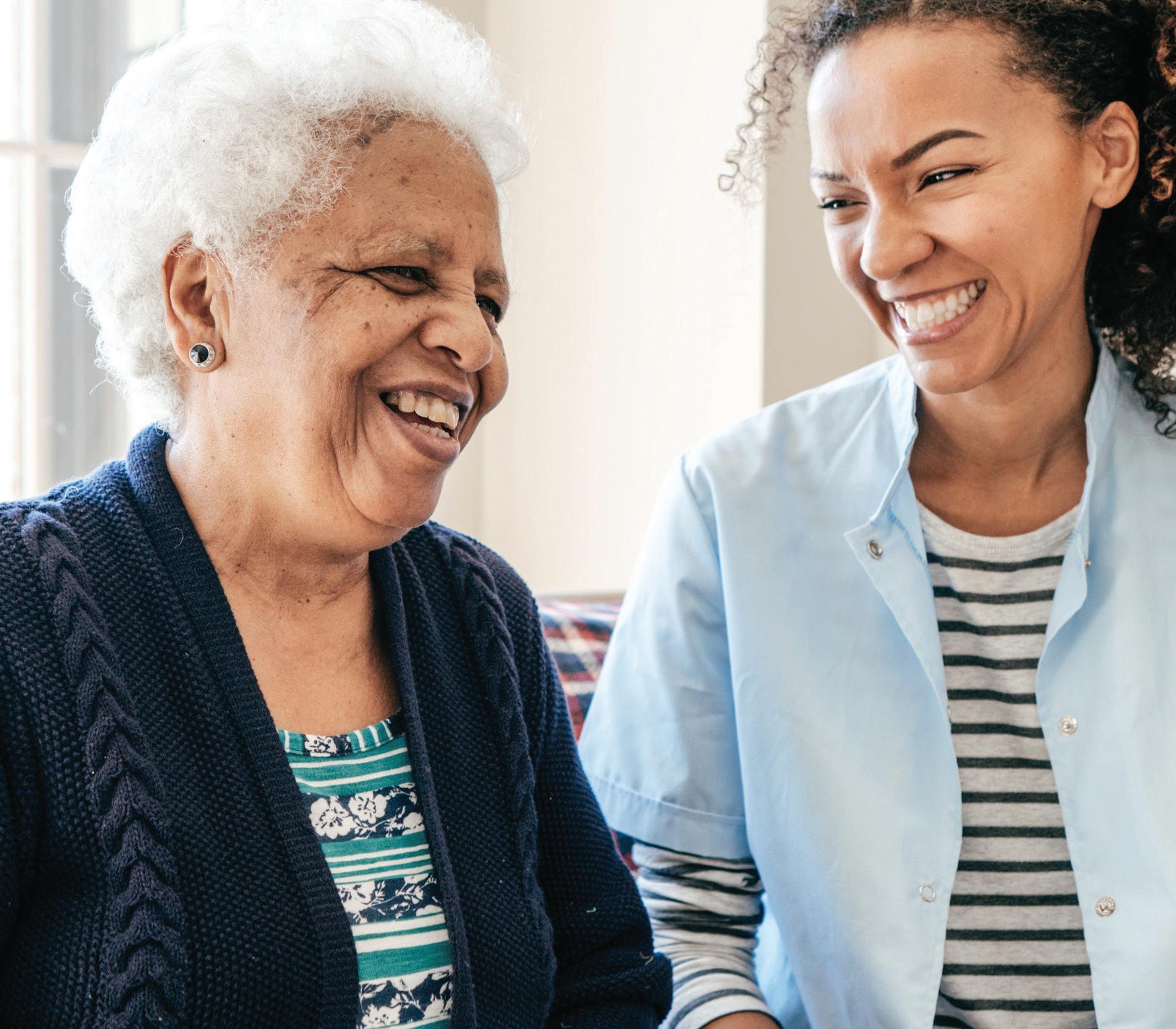
individuals’ health and well-being, so they continue to be as independent as possible, for as long as possible, in the setting of their choice.

Providing resources & information to older adults & caregivers
Community Engagement staff are dedicated to spreading awareness of PCA’s programs and services through group presentations, dissemination of materials and community alliances.
The number to call for services & resources to help older Philadelphians & people with disabilities
Friendly and knowledgeable staff answer calls each weekday, from 8:30 a.m. through 5 p.m., taking information and referrals, then directing callers to the proper resources or assessments needed to qualify for services. For assistance, call 215-765-9040 or go to pcaCares.org/request-assistance.
“We are not waiting for people to come to us. Instead, we are making sure that PCA staff are regularly reaching out in the community. We know there are many diverse voices in Philadelphia, so we listen to all stakeholders who we should be supporting,” said PCA President and CEO Najja R. Orr, DBA, FCPP. “PCA cultivates and maintains strong partnerships with more than 500 community partners in Philadelphia’s aging network and also relies on advisory groups representing the interfaith, Asian, Latino, African/Caribbean and LGBTQ+ communities.

“ The most common calls we get are general questions from concerned citizens looking for more information about the services that PCA provides. We often assist older adults with issues related to financial exploitation, as well as other protective services concerns. Our department has operated with a commitment to service since PCA was established in 1973. Our team of 30 dedicated and knowledgeable specialists and supervisors undergoes a rigorous training process to excel in assisting our callers,” says Nolan Lawrence, PCA Helpline director.
Opportunities for socialization, education, fitness & meals
PCA funds 28 senior centers and satellite meal sites throughout Philadelphia that support the social, emotional, and physical well-being of older adults, providing avenues to nutrition, recreation, exercise, technology use, benefits and health.
” ”
“This center is the place to be! The seniors really need it. We serve a weekday meal so that everybody can eat together and enjoy each other’s company. So, when they come here, we try to make it like a family environment,” says Elizabeth Morales Rosa, program coordinator at Norris Square Senior Community Center, a Spanish/English bilingual senior center serving a large Latino population in North Philadelphia.
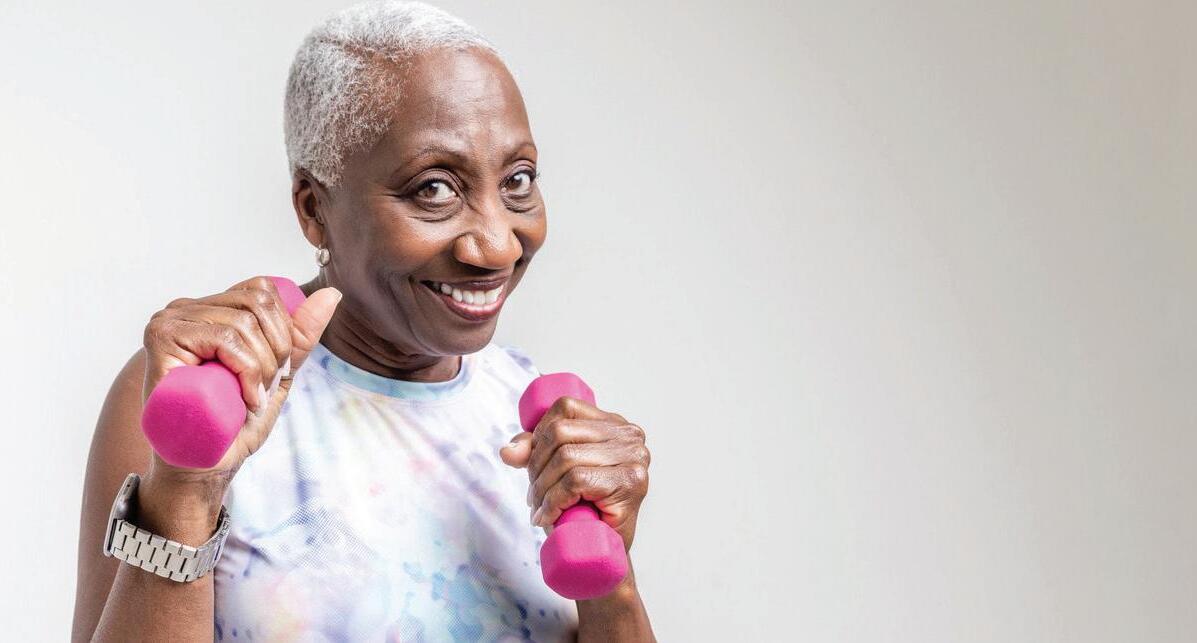
Information & resources help manage chronic conditions & reduce disability risk
Evidence-based programs provide free communitybased education, screenings and fitness activities that focus on chronic disease and pain management, exercise, diabetes, and falls prevention.
Free locally grown, fresh produce for incomeeligible older adults

This program increases older adults’ access to fresh produce available at local farmers markets and supports Pennsylvania farmers.
“
This program has been life changing for me. Using the action plan as a platform to build an exercise program for myself as an older adult with health challenges has made a great difference in my life and health. I have also been challenged to change my eating habits to a better eating plan. The format of using the action plan, the excellent materials and the presenters, who have modeled how to teach and lead the program, have been exceptional. The materials and the structure of the virtual training has led to success. The Monday sessions are an excellent model of how to present the materials. The Wednesday practice sessions helped us as participants to experience success as we demonstrated our presentation skills. I have had the opportunity and privilege of sharing the information about the availability of these courses for seniors to several of my physicians. Each one of them was pleased to learn about this resource,” says Betty J. White, 80, who participated in PCA’s Chronic Disease SelfManagement Program and found it so useful that she became a certified volunteer leader.
“Fresh fruits and vegetables are an essential part of our diets, especially with older adults. Through the Senior Farmers Market Nutrition Program, income-eligible older adults receive $50 worth of vouchers for farmers markets around the city to get fresh produce that they wouldn’t normally have access to,” says Skylar Young, PCA’s special projects coordinator.
Active adults 55-plus provide regular companionship & assistance to older adults who are homebound
Friendly visitors use their time, talents and skills to improve the lives of older adults. Senior Companions are income-eligible older adult volunteers who receive a small stipend for their service. (See story on page 18.)

Skill building & career support for
PCA-funded employment programs help older workers overcome the challenge of finding work or changing jobs in today’s technology-driven labor market by providing on-the-job training and employment opportunities.
Assistance with navigating Medicare, Medicaid and prescription drug programs
Pennsylvania Medicare Education and Insight (PA MEDI) is the state health insurance assistance program that provides free counseling to help Medicare beneficiaries of all ages understand their health insurance options and make informed decisions to meet their individual needs.
“
PCA’s employment and job training programs provide a unique opportunity for older adults to reignite their passion for work, rediscover their talents, and contribute to their community in meaningful ways,” said Wanda Mitchell, PCA’s director of community engagement. “For many older adults, employment is more than just a means to a paycheck. It is a pathway to a renewed sense of purpose and fulfillment. Our programs help older adults build additional skills, develop new interests and connect with other people in their community. Through employment and job training, older adults can continue to grow, learn and make a difference in the world around them.
“
Thank you so much for the kind assistance you gave me in presenting health care options for my recently disabled son. I have been a registered nurse for over 45 years, and this has been extremely difficult for me to understand and navigate. I can imagine what it must be like for someone without any medical background to figure out. In addition to the knowledge you shared, I also truly appreciate the manner in which you shared it – non-judgmentally, patiently, with kindness and true concern. I (want you to) know how very valuable you are to those of us who are so distraught, fearful and overwhelmed by anxiety when a devastating lifechanging situation occurs. I am sure I will be contacting you again soon, as I still have some questions and second thoughts about possible insurance decisions,” said an anonymous recipient of PCA-funded PA MEDI health insurance counseling at Einstein Medical Center, who really appreciated that the information was provided in an objective, non-biased manner.
Evaluating individuals’ eligibility for long-term care services
A comprehensive in-home evaluation of an older adult’s needs and functional status is used to determine the appropriate services and where they should be provided.
Financial assistance & resources to support the wellbeing of those caring for a loved one
“Thank you for making the Functional Eligibility
Determination (FED) assessment process a pleasant experience for me. My PCA assessment worker was very knowledgeable, patient with me and did not make me feel rushed. He allowed me to ask questions and provided understandable, realistic answers. PCA did an outstanding job and provided good customer service to me,” said an anonymous PCA consumer.


PCA’s Caregiver Support Program provides a wide array of services and financial assistance to help unpaid caregivers – family and friends – who support older Philadelphians and people living with a functional or cognitive care need, as well as older adults who are caring for relatives in need, older relatives and grandparents raising children.
“The Caregiver Support Program is wonderful! It reimbursed me for the purchase of a stair ride for my mother. She was so depressed because the bathroom is on the second floor. Now, she can get up the stairs to take a shower. She’s so much happier. I just don’t know what I would do without the support, kindness and patience of you all in the Caregiver Support Program. It really means the world to me,” said an anonymous recipient of caregiver support from PCA.
”
Personalized coordination of person-centered, long-term services and supports Care management through PCA provides assistance to older Philadelphians who want to remain in their homes but need help with challenges associated with daily living and aging.
“I firmly believe that long-term care services play a vital role in the lives of our older adults, enabling them to age with dignity, independence and the support they deserve. At PCA, we understand the unique needs of older adults and the challenges they may face. Our long-term care programs are designed to provide comprehensive assistance, advocating for their rights, empowering families and ensuring that older adults have access to the resources they need to thrive. We are committed to making a positive difference in the lives of our community’s elders and promoting a society that values and supports those who have contributed so much,” says Shani Gilmore, PCA’s executive administrator of long-term care.
Improving safety & accessibility at home
PCA’s Senior Housing Assistance Repair Program (SHARP) supports independent living by providing minor home repairs, including installing grab bars, tub seats, intercom systems, stair railings and other modifications.
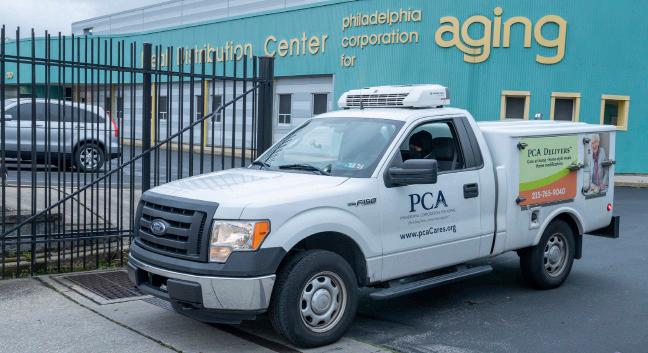
“You are to older adults what Santa is to children! You make our wishes possible and our dreams come true. You are definitely underrated and underappreciated. You deserve more praise – a lot more. To top off your wonderfulness, I recall that you are also a former military man. In that case, may I add, thank you for your service,” said an anonymous recipient of home repairs. “The PCA home repair mechanic went above and beyond in his service to me and helped me obtain the adaptations and repairs I needed.
Housing arrangements for adults who cannot live alone
For adults who wish to be as independent as possible, the Domiciliary Care Program offers a friendly home environment where participants can get help with daily needs, including food, laundry, personal hygiene and medication.
Delicious, healthy meals delivered to older adults
The home-delivered meal program provides basic nutrition and regular contact with a driver who can report any issues from older adults with whom they visit.
“For some people, Domiciliary Care really becomes a long-term home and a family. I believe that Dom Care has made a big difference in our consumers’ lives, many of whom would be homeless, or worse, if not for this program,” says Jean Janik, PCA director of community living options.
“Five days a week, Thomas Beaufort Jr. loads his truck with meals for delivery at PCA’s Meal Distribution Center (MDC). “It’s about 57 stops today,” says Beaufort, one of 20 drivers for PCA’s Home-Delivered Meals Program. “We have frozen meals in the truck, along with fresh complements, including milk, fresh fruit and bread. Older adults really rely on this food.
Michael Chambers manages PCA’s MDC, which delivers meals to 3,500 older Philadelphians each week. “It promotes independence with the consumers,” says Chambers. “This operation is making a difference in addressing food insecurity among older adults. It’s a good feeling knowing I am a part of something that makes such an impact.
Self-directed, long-term care for veterans of the U.S. armed forces
Eligible veterans can choose their long-term services and supports, including choosing a family member or friend to provide personal care so they can remain at home.
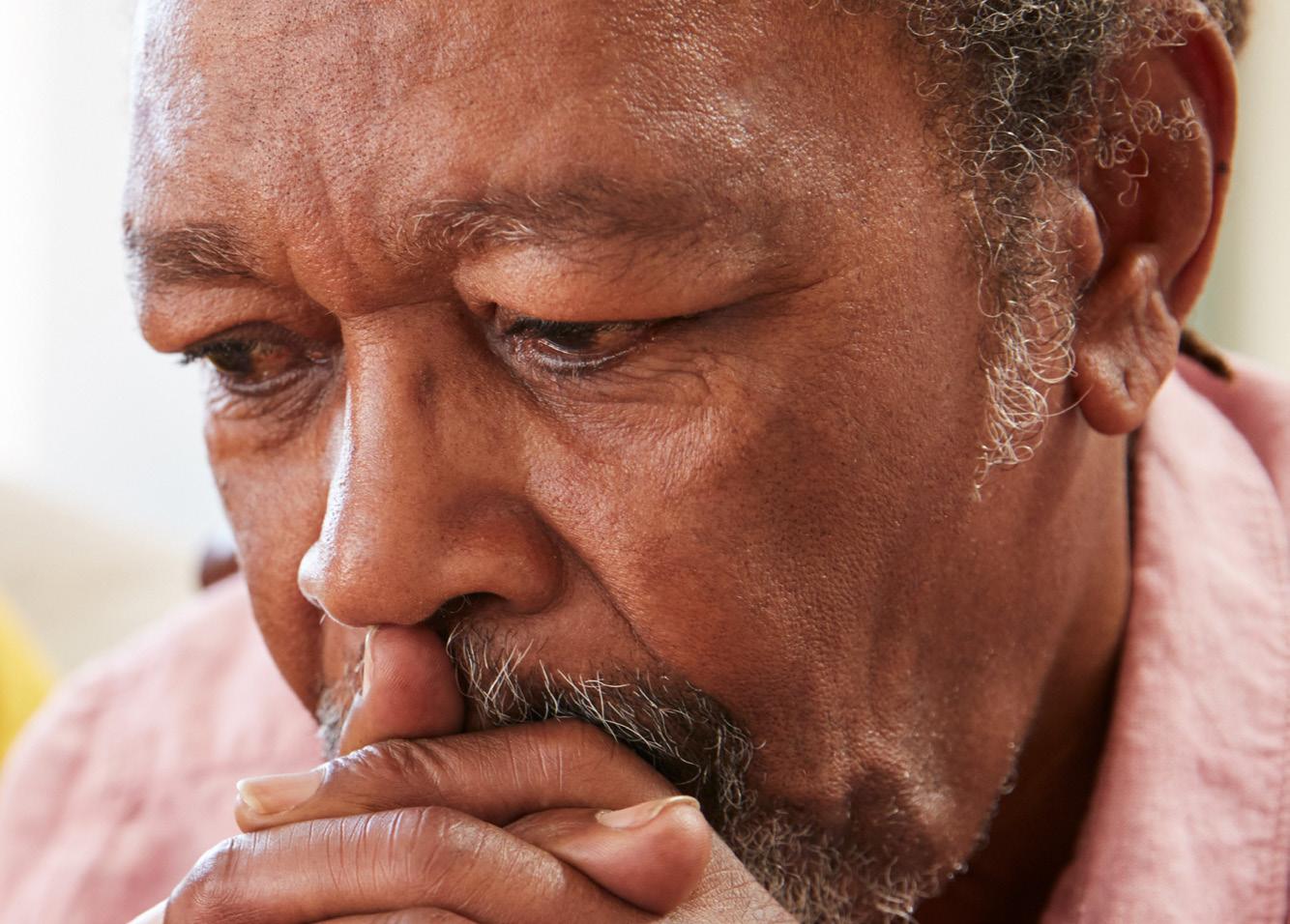
Confidential investigations of reports of suspected elder abuse
PCA’s Older Adult Protective Services investigates reports of suspected abuse, neglect and financial exploitation of Philadelphians 60 or older. Staff intervene when an older adult lacks a responsible caregiver, poses an imminent risk of danger to self or property, and/or cannot perform essential tasks or obtain necessary physical and mental health services.
“Our goal is to help older adults in Philadelphia live safely and independently in their homes and communities. Older Adult Protective Services plays a critical role in achieving this goal by providing essential services to those who are most vulnerable to abuse and neglect. We are committed to making sure that every older adult in Philadelphia is able to live safely and with dignity. We know that there are many challenges facing older adults in today’s urban landscape, but we also know that there is a lot of good work being done to help them. The Older Adult Protective Services unit is proud to be a part of that work, and we will continue to do everything we can to support and protect our city’s older adults,” says Tamikia Morris, director of Older Adult Protective Services at PCA.
Anyone can report suspected elder abuse or neglect, 24/7, by calling the PCA Helpline at 215-765-9040. Reports are anonymous and confidential.
Advocates for residents in long-term care facilities
Staff and volunteer ombudspersons visit long-term care residents to inform them of their rights and investigate complaints against care facilities, including issues related to residents’ finances, quality of life and communication.
“PCA, as an organization, benefits from the experience, dedication, and support of older adults. These active, older adult volunteers, in turn, allow PCA to expand its reach to help more older adults achieve independence in their lives that may otherwise be out of reach. Their unwavering commitment to serving our community is a testament to the power of aging with purpose,” says Lynda Pickett, PCA’s assistant director of community engagement.
Advice & assistance for older adults with legal challenges or proceedings
PCA supports a comprehensive program of legal services for older Philadelphians, including help with wills, benefits, taxes, small claims court, landlordtenant disputes, mortgage problems, consumer protection issues, and abuse or neglect.
“
Older adults who need answers and help often do not know where to begin, so they may not get the assistance they require, or they may lose time searching through various websites or calling multiple agencies with mixed results. Thanks to the legal services offered through PCA, older people can receive the help they need from a trusted community advocate,” says Wanda Mitchell, PCA’s director of community engagement, who oversees the Legal Services Program.
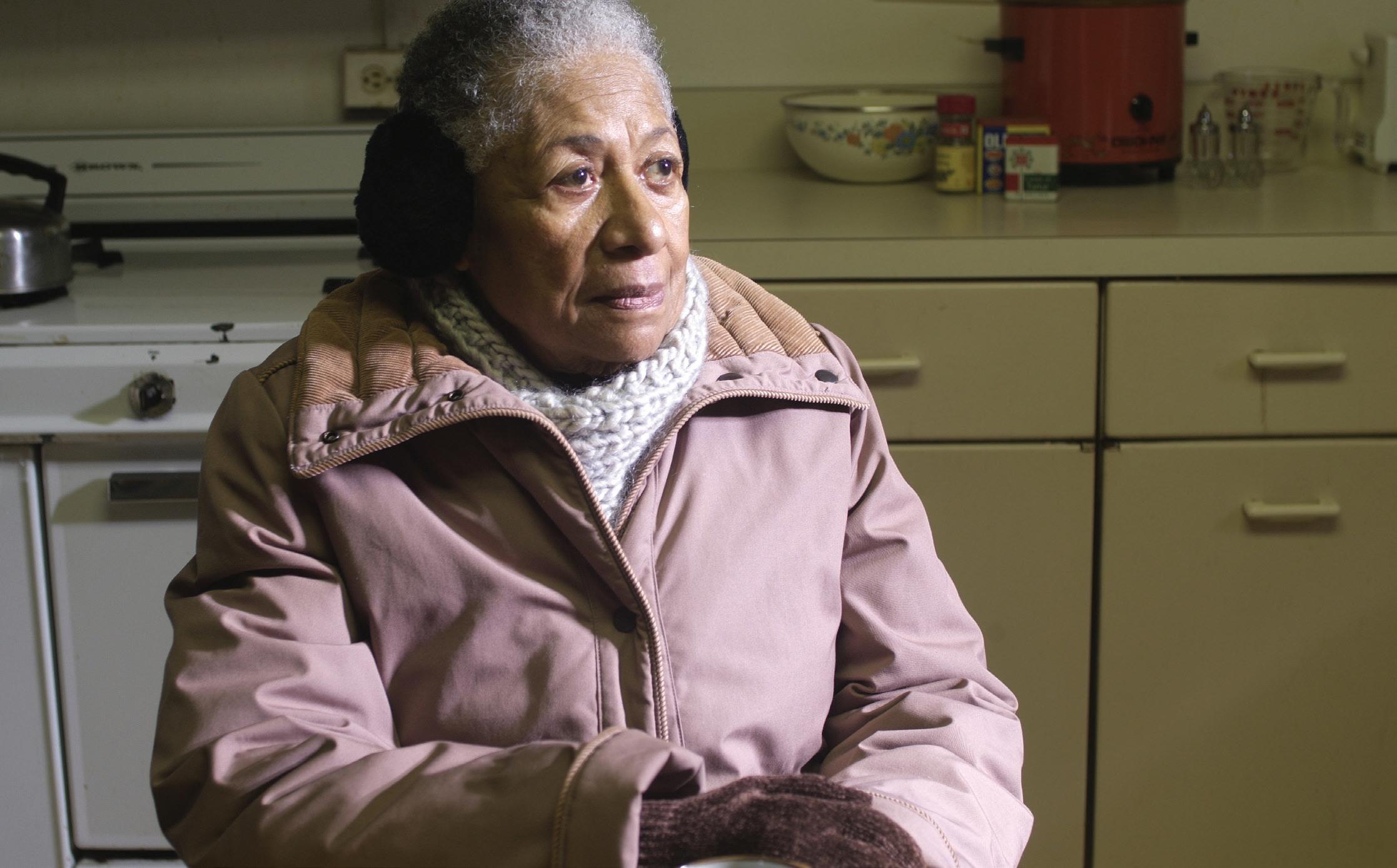
Income-based grants for older adults in dire need
The Emergency Fund for Older Philadelphians is a resource of last resort that provides crisis assistance to older adults with low incomes to provide the necessities – shelter, food, heat and medicine.
“The social worker at Mann Older Adult Center noticed that an older adult member, “Ms. P.,” was wearing socks and sandals in the winter. Since this was not appropriate dress for cold weather, the social worker spoke with the member to determine if she might need assistance. Ms. P. had just returned from a trip to her native country to bury her father. She had used all her money to purchase the plane tickets and pay for funeral expenses. When the social worker learned she didn’t have enough money to purchase winter clothing, Ms. P was referred to PCA’s Emergency Fund and received $100 for the purchase of winter shoes and warm clothing. “I am very appreciative for the assistance given to me by PCA,” said Ms. P. “The fund provides great assistance to us seniors who have limited funds for our basic needs. ”
Home-Delivered Meals: 1,195,674 meals
Congregate Meals: 333,286 shared meals
Senior Community Centers: 14,204 older adults
Legal Assistance:
45,000 hours of legal services
Ombudsman Services: Assistance to 1,225 people, including complaint resolutions and facility visits
Information & Referral: 99,603 calls for resources & services
Equipment & Supplies: Provided to 750 people Home Support: 2,400 service visits Assessments: 62,383 evaluations of older adults
Caregiver Reimbursement: 818 caregivers
Emergency Fund for Older Philadelphians: 1,018 grants provided to older adults in crisis Senior Companion Services: 48,804 hours
Employment Services:
418 older adults connected to jobs
Volunteer Services: Counseling & education to 1,400 people | Mass education to 2 million people
Passenger Transportation Services: 81,849 trips
Personal Care:
379,104 service hours
Personal Assistance: 230,593 service hours
Environmental Modifications: 2,670 home modifications
Care Management:
8,097 older adults provided with services & resources
Protective Services: 9,403 reports of suspected elder abuse
Domiciliary Care: 152 adults connected to home sharing
Public Support:
PA Dept of Aging: Aging Block Grant
Other State Sources (Title XIX) Federal Awards
City of Philadelphia
Other Revenue: In-Kind Contributions
Grants and Other Revenue
Subtotal
$60,406,490
$782,279
$6,734,139
$263,483
68,186,391
Long Term Care: 64%
Adult Day Care
Assessments
Care Management
Consumer Reimbursement
Domiciliary Care
Guardianship
Home Delivered Meals
Home Support
Medical Equipment & Supplies
Ombudsman
Personal Assistance
Personal Care
Professional Evaluation
Protective Services Subtotal
Community Services: 15%
$162,273
$7,580,560
$8,419,942
$3,010,109 $912,915
$553,715
Congregate Meals
Employment
Legal Assistance
Senior Companion
Senior Community Center Services
Volunteer Services
Access Services: 7%
ADRC Information and Assistance
Subtotal
3%
$5,397,844 $1,146,749 $449,274 $368,645 $6,241,842 $3,074 $13,607,428 $165,101 $4,618,107 $1,800,000 $6,583,208 $3,083,786 $9,723,932 $90,077,154
$3,083,786
$9,723,932
$6,583,208
$13,607,428
$50,000+
MKM Foundation
$20,000-$49,999
Independence Blue Cross
PA Health & Wellness
$10,000-$19,999
Always Best Care Senior Services
Anonymous Lindo Foundation
$5,000-$9,999
A-Team Home Care
Eden Health Care
Exude Grandom Institution
Highmark Wholecare
Icare Home Care LLC
KleinLife/Rawnhurst NORC
Holly Lange
Mendoza Group
NewCourtland Senior Services
The Nutrition Group
PECO, An Exelon Company
Trinity Health PACE/Mercy LIFE
$1,000-$4,999
AARP
Ardmore Toyota
BAYADA Home Health Care
Mary Brewster
Cardinal USA Fuel Oil
Cobra Electric
Mark Cornfeld
John Culhane Jr.
Lien Ngoc Do
Dunleavy & Associates
Teresa Elliott
ePlus Technology Inc.
F.O.P. Senior Citizens Inc.
Irene Garner
David & Linda Guendelsberger
Mary Hugues
InnovAge LIFE
Innovations Home Care Inc.
James Branch Cleaning Services Inc.
Jefferson Health Plans
The Labov Plumbing & Heating Supply Inc.
Laredo Mechanical LLC
Law Offices of Debra G. Speyer, Esq.
Lifeline
Loving Care Senior Services
Lyquix
Main Line Health
Anthony & Patricia Mendicino
Michael Beaumont General Contractor LLC
Najja R. Orr, DBA, FCPP
Penn Asian Senior Services
Cyana Perry
Philadelphia College of Osteopathic Medicine
The Philadelphia Foundation
Philadelphia Insurance Companies
Philadelphia Phillies
S. R. Wojdak & Associates
Saltz Mongeluzzi Barrett & Bendesky
Salus University
SarahCare Senior Services
Senior Helpers Home Health Agency
Square One Inc.
TruCare Home Care
UPMC Community HealthChoices
VitaCare Home Health Inc.
Wawa Foundation
John Whitman
Paul Williams
Rodney D. Williams Family
$500-$999
Denise Adamucci
William Bensley
Bensley Law Offices
Richard Boardman
Bodell Bove LLC
Louis Bove, Esq.
Center for Advocacy for the Rights and Interests of Elders (CARIE)
Center in the Park
Cigna
Louis Colbert
Collaborative Consulting
Delaware County Office of Services for the Aging
Rose Dimaria-Ghalili
John & Tamra Dodds
Drexel University College of Nursing & Health
Professions
Vincent P. Durso
Edge Hill Nursing & Rehabilitation Center
Jack Edmondson Inc.
Richard Eynon
Mary J. Fallon
Fountain View At Logan Square
Grant Thornton LLP
Pearl Graub Goldstein
Lynn & Thomas Harris
Haven Behavioral Hospital
Jean Hemphill
Home Instead
HomeCentris Healthcare LLC
The Honickman Foundation
Impact Total Fitness
Impactful Senior Home Care LLC
Robert Krebs
Liberty Resources Home Choices
Whitney Lingle
Mary Ann McCluney
Christopher Miller & Dr. Danielle Snyderman
William Nelson
David Nevison
Northwestern Mutual Wealth Management Co.
Oak Street Health MSO LLC
On
Nayda Pagan-Piazza
Pennsylvania Home Care LLC
Personic Health
Betty Jo Robinson
Theresa Sayce Goldsby
Securitas USA
SeniorLAW Center
Rheta Smith
Thomas Snedden
STAAR Alert
Successful Aging Care Net
Martha Takats
Joel TeBeest
Temple University School of Social Work
Truist
United Healthcare Community Plan of Pennsylvania
University of Pennsylvania
UUH Outreach Program
Sally Wagner
Catherine Waugh
Laura Weinbaum
Workplace Central
Eloise Young
$200-$499
6abc
Gregory Benjamin
Bochetto & Lentz P.C.
Earle & Yvette Bradford
Charities Aid Foundation of America
Neysa Clarkson
Kathryn M. Courter
Michael J. Donahue
Nancy Dwyer
Michael Eisner
Kathleen Foster
Joanne Harmelin
Humana
Constance Jones
Jerry & Barbara Kaplan
David Katz
Eleanor Kazdan
Alexandra Khristitch
Joni King
Susan Klein
Leah Kleylein
Joseph Leonardo
Local Initiatives Support Corporation (LISC)
Martin Luther King Older Adult Center
Sandra McNally
Anne Mitchell
Mary Mullen
Earl Murray
Tae Oh
Barbara Oldenhoff
Philip Jaisohn Memorial Foundation
Lissette Ramos Sarfraz
Christine Shiffer
Ann Silverman
The generosity of hundreds of donors has strengthened PCA’s ability to provide resources, direct care and support to keep older adults safe at home and engaged in their communities. We will always achieve more together than we could alone. Your continued generosity is vital to our future.
PCA is pleased to acknowledge the individuals, foundations and companies that made contributions in fiscal year 2024. Every effort was made to ensure proper recognition of each donor.
$200-$499 (continued)
Jacob Speidel
Lynne Strieb
Steven Touzell
Francine Williamson
Jacqueline Zinn
$100-$199
Bianca Allen
Anonymous
Carl Bailey
Lisa Bell
Kamryn Bonds
Brandywine Valley Active Aging
Diane Brown
Janet Burnham
Francis & Anna Byrnes
Linda Cashman
Karen Chenoweth
Helen-Ann Comstock
Michael Cooper
Juanita Copeland
Ann Danish
Patricia Delacy
Carl Dellmuth
Demountable Concepts
Michael DiGregorio
Robert Donohue
Nora Dowd Eisenhower, Esq.
Brian Duke
Jennifer Engelbrecht
Patricia Feldman
Kristina Fransel
Joseph Freedman
Laverine Freeman
Gail Garrett
Peggy Garvin
Emily Gerber
Raza Gilani
Shani Gilmore
Teja Goud Talla
Claudia Tesoro & Richard Greenstein
Joseph Grugan
Joanne Hajoway
Karailee Hamilton
Penny Hazelton
Teresa Heavens
Dorothy Heinz
Dr. Arthur & Mrs. Myra Helfand
Charlotte Heller
Lynn Carson Hepp
Yolanda Houston
IVN Sound & Communication LLC
Johnson & Johnson Foundation
Bobbi Jones
Lynette Killen
Joan & Sheldon Klein
Joseph Klein
Leif Owen Klein
Jeffery & Noelle Kodroff
Susan Krug-Gourley
Nolan Lawrence
Esther Lee
Patience Lehrman
Ruth Levikoff
Frederick Lewis
Doris Lowry
Anthony Malone
Linda Mark
Eugene Mathis
Rachel Mausner
Steven & Sylvia Mayover
Amanda Mcintyre
Wanda Mitchell
Joan Mower
Mark Myers
John Patricia Newby
Barbara Nickels
Mason Noble
Jennifer Norman
Northeast Older Adult Center
Patience Olanitori
Sean Outen
Carole & Kenneth Parker
Karen Paulus
Jeanine Phung
Lynda Pickett
Debbie Potter
Timothy Rice
Helen Richardson
Kenneth & Linda Romanowski
Jennifer Russell
Evelyn Ruth Sachs
Margaret Sayvetz
Alex Seltzer
Thomas Shea
Coleen Sherry
Marianne Sims
Wilma S. Slyoff
Rev. Lisa Smith
Rosalie Smith
Southwest Senior Center
Richard Spector
Starboard Homecare
Dr. Norma Thomas
Satya B. Verma, O.D.
Stacy Warner
Edda Weber
Mark Weber
Venice Williams
Cassandra Williams
Katherine Young
Heshie Zinman
Contributions to PCA’s two charitable funds have allowed us to expand our reach, even during crisis and limited funding.
Philadelphia Fund for Seniors – PCA established this fund in 2014 to supplement public funding that had not kept pace with the growing needs of older Philadelphians. Each gift allows PCA to direct its support to the areas of greatest need, including expanding nutrition and housing programs.
Philadelphians – The Emergency Fund Coalition consists of 22 organizations founded this fund in 1979 to provide crisis assistance to at-risk, low-income older individuals who are facing severe financial hardship.
Donations can be made to either of PCA’s charitable funds by visiting pcaCares.org/ donate or calling 215-765-9000, ext. 5053.
PCA is funded primarily through federal and state sources. Governmental grants are received primarily through:
• Administration for Community Living
• AmeriCorps
• Pennsylvania Department of Aging
• Pennsylvania Department of Human Services
• Philadelphia Office of Behavioral Health & Intellectual disAbility Services
• U.S. Department of Agriculture
• U.S. Department of Housing & Urban Development
• U.S. Department of Justice via the Pennsylvania Commission on Crime & Delinquency
• U.S. Department of Labor
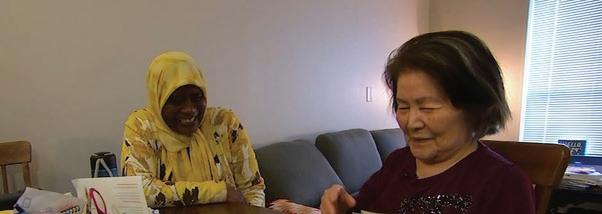
When Deborah Washington retired in 2013 after 26 years as a letter carrier with the United States Postal Service (USPS), she wanted to continue serving the community. “I retired from a job, not from life,” said Washington, who served for 10 years in the Marines before joining the USPS. “Once you retire, you keep on doing what you were already doing. So, if you weren’t active (before retirement) then you won’t be active (after retiring). But I was already active.”
After overhearing a conversation about PCA while riding on the subway, she wanted to learn more about the agency. Washington soon began volunteering with PCA’s Senior Companion Program, a person-to-person service program for older adults.
Through the program, companions aged 55-plus are paired with older adults who are homebound, isolated and need assistance to remain in their homes. Senior Companions provide socialization and assist with daily tasks, including light meal preparation.
Washington, 65, of Overbrook Park, was paired with Masa Hunley, 89, almost three years ago.
PCA first introduced the two women to each other to see if they were a match. “She was worried about (getting along with) me,” Washington said.“I wasn’t worried about her because I knew she was going to like me. We hit it off really well.”
As a Senior Companion, Washington regularly visits
Hunley twice a week in her Germantown apartment. By assisting with small tasks, such as shopping and escorting Hunley to medical appointments, Washington helps give her companion a better quality of life.
Sometimes, the two will take a walk together or go out to lunch. “She’s fun. Almost like my grandmother,” Washington said. “She has a good way about her. She thanks me, then I thank her for giving me a chance to serve and for trusting me to come into her home.”
Washington is also thankful for the opportunity Hunley provides for “loving up on her” and to be able to soak up the wisdom that Hunley has learned and earned.
In return for their service, Senior Companion volunteers receive an hourly tax-free stipend; travel and meal reimbursements; paid holiday, sick and vacation time; paid pre-service training; and four hours of continuous monthly training.
Her desire to serve stems, in part, from her Islamic faith. The mother of two sons became a Muslim 30 years ago while seeking spiritual guidance.
Serving as a Senior Companion to Hunley is “just something that I enjoy doing, as if it was my mom or my grandmom, who have both passed,” Washington said. “So, it’s like serving them and praying that, if it was my mom or my grandmom, someone would be doing the same thing. It has to be in your heart.”

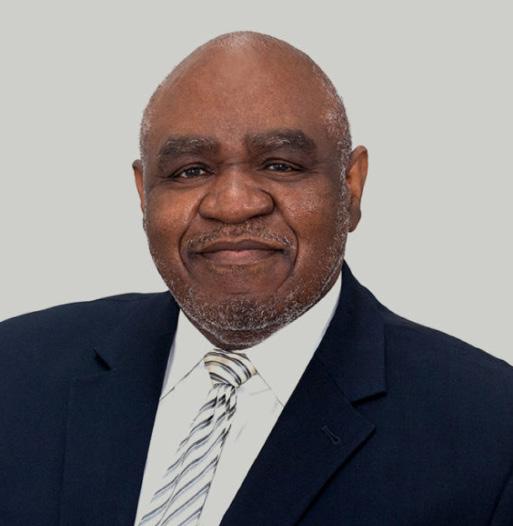

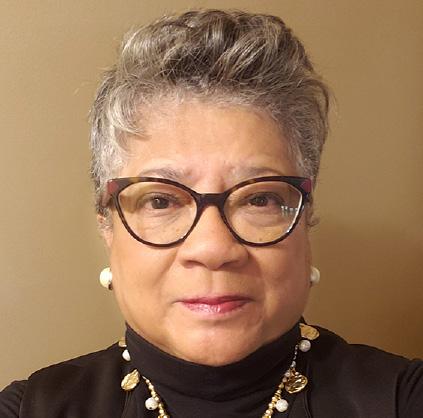


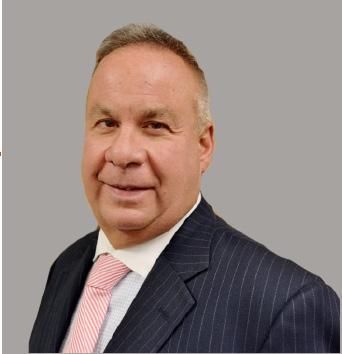
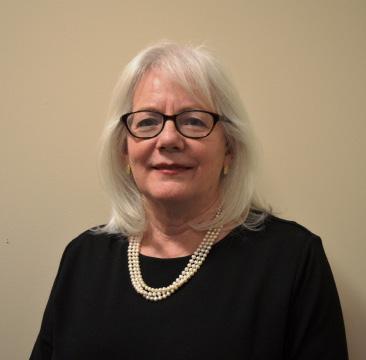
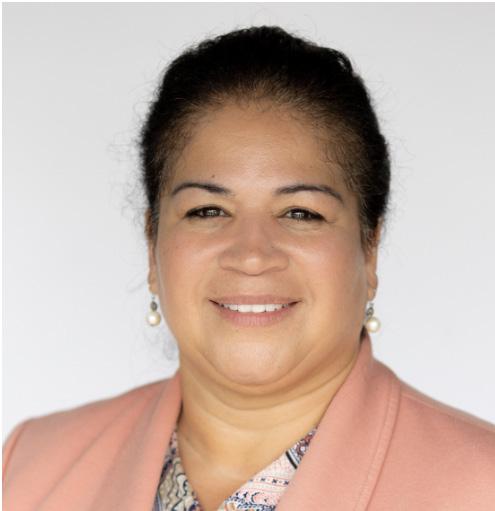
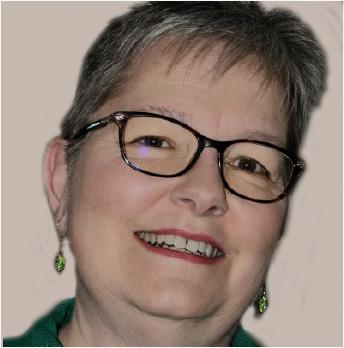
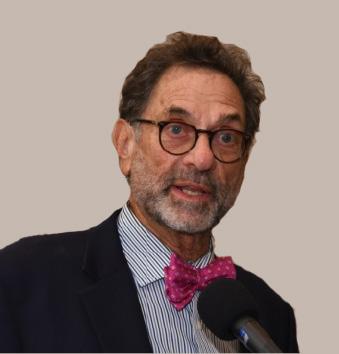
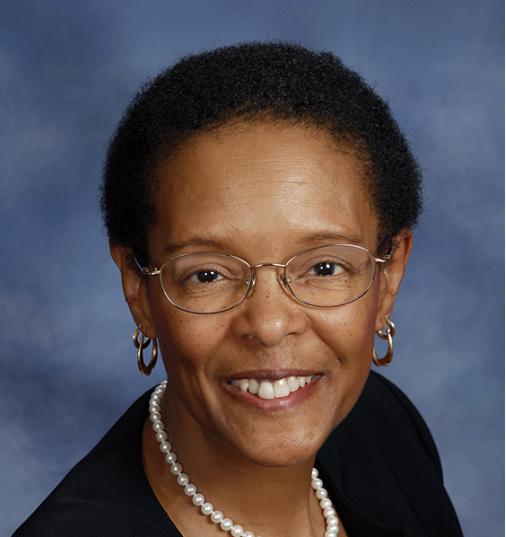


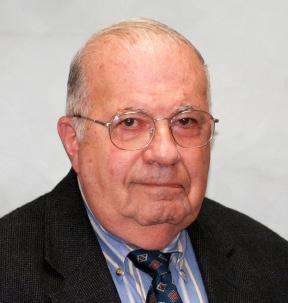
PCA is governed by its board of directors, which guides the development and administration of agency programs, the Area Plan for Aging Services and the annual budget. An advisory council provides input to the board and acts as an advocating body.
(Not pictured)
Sandra McNally, Chair
Carl W. Bailey
Joseph J. DiMeo Jr.
Teresa Elliott
Florence Gallagher
Nida Imperial
Frederick Lewis
David Nevison
Vera Tolbert
Linda Tyler
Heshie Zinman
Glenn D. Bryan Chair Louis G. Colbert Vice Chair Eloise N. Young Treasurer Lynn Fields Harris Secretary Satya B. Verma, OD Immediate Past Chair Denise Adamucci Louis Bove, Esq. Nora Dowd Eisenhower, Esq. Wilmarie Gonzalez Sandra McNally Paul Nathanson Norma D. Thomas, D.S.W. John Whitman Jacqueline S. Zinn, Ph.D. Emeritus: Arthur E. Helfand, D.P.M.642 N. Broad St. | Philadelphia, PA 19130-3409
Main phone: 215-765-9000
Fax: 215-765-9066
Call us weekdays, from 8:30 a.m. to 5 p.m., for general inquiries or 24/7 to report suspected elder abuse: 215-765-9040 1-800-482-9060 (toll-free, outside Philadelphia) 215-765-9041 (TDD for hearing impaired)
FIND US ONLINE: pcaCares.org Facebook.com/pcaCares.org Twitter.com/pcaCares_org LinkedIn.com/company/Philadelphia-corporation-for-aging
Read more about PCA’s programs, services and accomplishments at pcaCares.org. © June 2024. Philadelphia Corporation for Aging. All rights reserved.